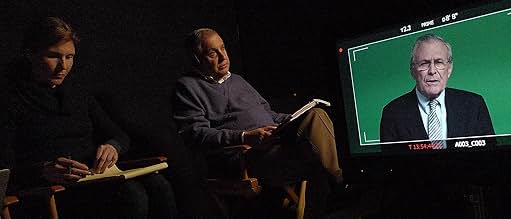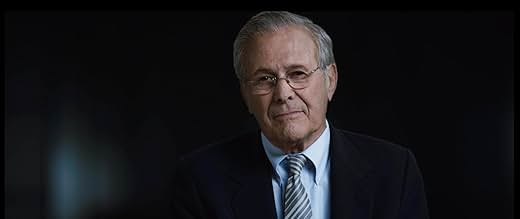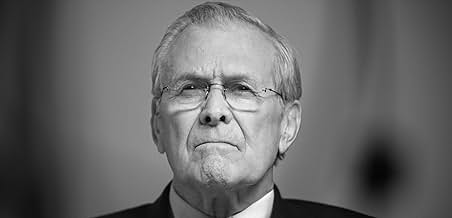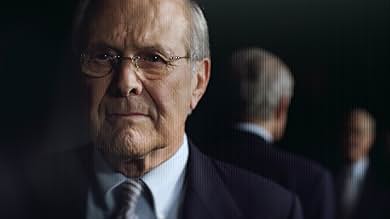VALUTAZIONE IMDb
7,0/10
4323
LA TUA VALUTAZIONE
Aggiungi una trama nella tua linguaFormer United States Secretary of Defense, Donald Rumsfeld, discusses his career in Washington D.C. from his days as a congressman in the early 1960s to planning the invasion of Iraq in 2003... Leggi tuttoFormer United States Secretary of Defense, Donald Rumsfeld, discusses his career in Washington D.C. from his days as a congressman in the early 1960s to planning the invasion of Iraq in 2003.Former United States Secretary of Defense, Donald Rumsfeld, discusses his career in Washington D.C. from his days as a congressman in the early 1960s to planning the invasion of Iraq in 2003.
- Regia
- Sceneggiatura
- Star
- Premi
- 2 vittorie e 9 candidature totali
Trama
Lo sapevi?
- QuizThis same director also made Fog of War, a similar film that featured an extensive interview with Vietnam-era Secretary of Defense, Robert McNamara. Both films were highly critical of their lead subjects management of war.
- Curiosità sui creditiIvan & Boris
- ConnessioniFeatured in At the Movies: Venice Film Festival 2013 (2013)
- Colonne sonoreWhite Christmas
Written by Irving Berlin
Performed by Tennessee Ernie Ford
Courtesy of Capitol Records Nashville under license from Universal Music Enterprises
Recensione in evidenza
There's something maddeningly chaotic about Donald Rumsfeld's logic in terms of US international policy. When he was in press conferences during the Iraq War under W Bush, Rumsfeld's answers to tough questions often rang of the so-called "double-speak", a term which is associated with but not explicitly used in George Orwell's "1984". He would respond with other questions or make unfunny jokes. He would use strange metaphors. Rarely did he simply answer direct questions. Errol Morris' documentary about Rumsfeld is strangely similar. He has Rumsfeld do most of the talking, and what comes out of the former Defense Secretary's mouth is a barrage of inconsistencies, untruths, and illogical conclusions. In short, Rumsfeld's whole way of thinking is a jumbled incomprehensible mess. And yet, he was one of the most powerful people in the W Bush administration during the first decade of the 21st century. You could argue W Bush had flawed judgment, Dick Cheney was immoral, but Rumsfeld is in his own realm. As Morris said in an interview, he was one of the most "self-deceiving" people he had ever interviewed.
The format of the documentary is one of the strangest you'll ever see in a film of this type. The subject himself is the narrator. He narrates and then comments on the different subjects covered in the documentary. He occasionally answers questions posed by Errol Morris who can be heard in the background. One of the former Defense Secretary's most interesting phrases is "the absence of evidence is not evidence of absence", a phrase coined by Carl Sagan when referring to the unknown realms of outer space. Rumsfeld is famous for composing 1000's of email memos, and recurring throughout the memos are his definitions of particular words and terms which are displayed on-screen. The film traces his childhood, his early years in politics under President Nixon and briefly under Gerald Ford. He was an adviser for Governor Reagan and later for President Reagan and George Bush Senior. Most of the documentary concerns the Iraq War and his tenure as Defense Secretary under George W Bush.
One example which highlights Rumsfeld own self-deception and denial is when Morris asks about the public perception concerning Saddam Hussein after the 9/11 attacks. Rumsfeld in the documentary claims people knew that Hussein and Iraq had nothing to do with 9/11. The documentary then cuts to a Rumsfeld press conference clip of 2003 in which a reporter quotes Saddam Hussein: "I would like to tell you directly we have no relationship with Al Queada." Rumsfeld's reply: "And Abraham Lincoln was short." The reporter than asks Rumsfeld to respond to Hussein's statement and the Secretary of Defense simply says that Hussein "rarely tells the truth". The implication is clear: Rumsfeld wants the public to believe that Hussein and Iraq contributed to 9/11. If you read between the lines, and realize what is unsaid rather than said, Rumsfeld never actually states that Hussein is lying about having a relationship with Al-Queada. He makes the Lincoln analogy joke and he says that Hussein has a pattern of lying, but never once did Rumsfeld himself directly accuse Hussein of lying about having a relationship Al-Quaeda. This is the kind of double-talk, doublespeak which is how Rumsfeld's reasoning seems to work.
People have criticized the documentary as raising many more questions than it answers. This may be the point of the film. Rumsfeld comes off, at best, as a completely self-deceived person whose rationalities have no logic, and at worst an amoral international leader who got us into an unjust war. His logic, we "lacked imagination" to see the Japanese coming when they attacked Pearl Harbor and thereby justifies the War in Iraq. As Morris points out in an interview, if we can imagine our enemies doing anything in the future, then we can rationalize military operations for almost any reason at any time.
The format of the documentary is one of the strangest you'll ever see in a film of this type. The subject himself is the narrator. He narrates and then comments on the different subjects covered in the documentary. He occasionally answers questions posed by Errol Morris who can be heard in the background. One of the former Defense Secretary's most interesting phrases is "the absence of evidence is not evidence of absence", a phrase coined by Carl Sagan when referring to the unknown realms of outer space. Rumsfeld is famous for composing 1000's of email memos, and recurring throughout the memos are his definitions of particular words and terms which are displayed on-screen. The film traces his childhood, his early years in politics under President Nixon and briefly under Gerald Ford. He was an adviser for Governor Reagan and later for President Reagan and George Bush Senior. Most of the documentary concerns the Iraq War and his tenure as Defense Secretary under George W Bush.
One example which highlights Rumsfeld own self-deception and denial is when Morris asks about the public perception concerning Saddam Hussein after the 9/11 attacks. Rumsfeld in the documentary claims people knew that Hussein and Iraq had nothing to do with 9/11. The documentary then cuts to a Rumsfeld press conference clip of 2003 in which a reporter quotes Saddam Hussein: "I would like to tell you directly we have no relationship with Al Queada." Rumsfeld's reply: "And Abraham Lincoln was short." The reporter than asks Rumsfeld to respond to Hussein's statement and the Secretary of Defense simply says that Hussein "rarely tells the truth". The implication is clear: Rumsfeld wants the public to believe that Hussein and Iraq contributed to 9/11. If you read between the lines, and realize what is unsaid rather than said, Rumsfeld never actually states that Hussein is lying about having a relationship with Al-Queada. He makes the Lincoln analogy joke and he says that Hussein has a pattern of lying, but never once did Rumsfeld himself directly accuse Hussein of lying about having a relationship Al-Quaeda. This is the kind of double-talk, doublespeak which is how Rumsfeld's reasoning seems to work.
People have criticized the documentary as raising many more questions than it answers. This may be the point of the film. Rumsfeld comes off, at best, as a completely self-deceived person whose rationalities have no logic, and at worst an amoral international leader who got us into an unjust war. His logic, we "lacked imagination" to see the Japanese coming when they attacked Pearl Harbor and thereby justifies the War in Iraq. As Morris points out in an interview, if we can imagine our enemies doing anything in the future, then we can rationalize military operations for almost any reason at any time.
- classicalsteve
- 21 set 2014
- Permalink
I più visti
Accedi per valutare e creare un elenco di titoli salvati per ottenere consigli personalizzati
- How long is The Unknown Known?Powered by Alexa
Dettagli
- Data di uscita
- Paese di origine
- Lingua
- Celebre anche come
- Donald Rumsfeld: certezas desconocidas
- Aziende produttrici
- Vedi altri crediti dell’azienda su IMDbPro
Botteghino
- Lordo Stati Uniti e Canada
- 276.497 USD
- Fine settimana di apertura Stati Uniti e Canada
- 64.315 USD
- 6 apr 2014
- Lordo in tutto il mondo
- 301.604 USD
- Tempo di esecuzione1 ora 43 minuti
- Colore
- Mix di suoni
- Proporzioni
- 2.35 : 1
Contribuisci a questa pagina
Suggerisci una modifica o aggiungi i contenuti mancanti

Divario superiore
By what name was The Unknown Known (2013) officially released in Canada in English?
Rispondi























